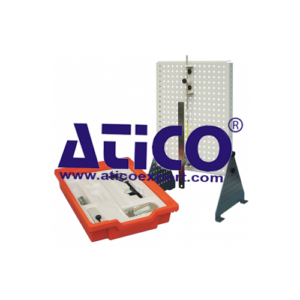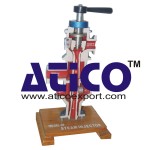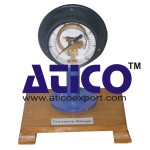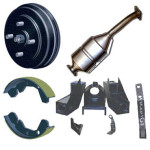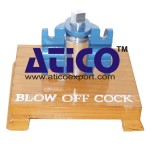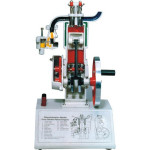Description
This versatile kit allows many experiments using different arrangements of its parts. Students, teachers or lecturers fi t the parts of the kit to the work panel (supplied separately) to study or demonstrate an engineering science topic. This kit includes different coiled springs for experiments in spring testing. These include extension springs, compression springs, parallel springs and springs that can connect in series. Students test the springs to prove Hooke’s law and find their spring rate, comparing it with given manufacturer’s values. They also test springs in parallel and series to see how this affects the overall spring rate. The kit helps students to understand the link between spring rate, spring extension and the design and construction of springs. It introduces students to key engineering terms such as: • Spring rate • Hooke’s Law • Spring pretension we supply a CD-ROM with the work panel. It includes all the worksheets, guidance notes and lecturer notes (with answers) needed for typical experiments with each kit. The selection of parts in the kits and the choice of fixing points on the work panel means that teachers or lecturers may extend the experiments to an even greater range. Note: The kit is for use with the work panel (supplied separately).
Learning Outcomes
- Hooke’s law and compression spring tests
- Hooke’s law and extension spring tests
- Parallel and series spring tests
Specifications
Atico is committed to a programme of continuous improvement; hence we reserve the right to alter the design and product specifi cation without prior notice.
Storage tray (with clip-on lid):
450 mm x 320 mm x 85 mm
Nett weight:
2.1 kg
Paacked volume and weight:
Approximately 0.015 m3 and 2.6 kg
Main parts:
• Compression spring tester
• Dial caliper
• Assorted coiled springs
• Rule
• Masses
Operating Conditions
Operating Enviroment:
Laboratory Enviroment
Storage Temprature Range :
–25°C to +55°C (when packed for transport)
Operating Temprature range:
+5°C to +40°C
Operating relative humidity range:
80% at temperatures < 31°C decreasing linearly to 50% at 40°C

